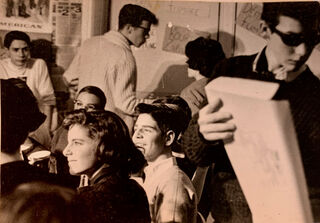Trauma
When Childhood Trauma Won't Let Go
An early trauma and a problem years later that I'd never thought to connect.
Posted April 23, 2021 Reviewed by Davia Sills
Key points
- You may be unaware of the impact an early trauma is having on your life.
- Behind a strong aversion can be an early trauma whose memory you have buried.
- To uncover the meaning behind a strong dislike, try to recall associated memories that are likely to be emotional.
We tend to take our strong aversions as a given, but behind them lies an explanation and a story full of feeling. Recently, I had reason to recall having once been so hostile to French as to have become entirely deaf-mute in the language, a condition I’d never understood. So, when I went digging to make sense of it, I kept an eye out for where deep emotion might lurk—and hit pay dirt.
First off, how did learning French ever became a “thing” in the life of a middle-class, Jewish child? It clearly began with my mother, a frighteningly hypercritical business executive for whom mastering French was a major life goal. She’d dreamed of going to the Sorbonne in Paris but with no money to get there settled for a public college in Manhattan, where she instead studied to teach French. She eventually got herself to Paris for a summer course but never cracked the code and was still enrolled in French conversation class when she died at 84.
How it all began.
As soon as I was old enough, My mother enrolled me in a French nursery school: École Française de Saint-Esprit (the French School of the Holy Spirit). I wasn’t ready to leave my nanny Amy—the tall, matronly object of my adoration (who lived with us for the next 70 years)—and certainly not to a place peopled exclusively with nuns in black habits. I hid in my locker every chance I got.

Now I remember my fearsome mother walking me to school, taking me from Amy, and delivering me to this grim underworld. In principle, the idea of early immersion in a foreign language is good. Children learn multiple languages without effort, and I might have picked up French. But under the circumstances, I didn’t.
And then I couldn’t. Six years later, when French was introduced in the fourth grade, I could repeat the sounds but heard nonsense, a problem that persisted into high school, where grades mattered. The summer after tenth grade, I spent a month at a new, remedial French camp in Maine. The days of classes and evenings of French films had no impact on the impenetrable wall of sound I heard, but the camp was not a waste: I met Madame.
Madame was the head of the French department of The Brearley, a fancy girls school that had rejected me when I’d applied for ninth grade. She was teaching for the month to help a friend who’d started the camp, and I fell in love with her on sight. What was it about her?
Now I realize that she reminded me of Amy. Tall and matronly, she was a dynamic, exuberant, powerful French Amy. Picture Julia Childs, whose promise to teach me to cook similarly electrified me 10 years later. From Madame’s opaque speech, I picked out… family… Lyons… village… Brearley girls (three of whom she’d have taken to France for the summer were she not in Maine). I passed this to my mother, who, after arriving to pick me up, cornered Madame and persuaded her to take me when she visited her elderly parents the following week.
Thus, I found myself sharing a hotel room with someone whom I regarded as more like a Greek deity than an actual human being. The combination of our bizarre physical proximity and my paralyzing hero worship was acutely uncomfortable. Failing to find any path in the thick fog of Madame’s conversation returned me to École Française and the locker.
Life at her parents’ home was half dream, half nightmare. Her parents beamed at me shyly and offered fabulous things to eat. The house was set in an immense garden of edibles. I spent days picking whatever luscious fruit was most ripe, which Grandmère then cooked into jam and a syrup she added to seltzer. Fortified with a memorized sentence, I walked twice a day to buy bread and was given a chunk of it with chocolate for an afternoon snack, like all French children.
The nightmare part was my pitiful isolation. At night, I memorized textbook phrases I could use at the table: Voudrier-Vous me faire passer le beurre? (Would you be so kind as to pass me the butter?). Every afternoon had a dictée, the dictation of a literary paragraph. All I could do was record the gibberish and then try to break it into the words I knew from written French.
How it ended.
One afternoon, Madame took me on a long walk to a distant village to visit a friend with whom she’d been in the French Resistance. We walked; she talked. I sat with the two women as they chatted away in a verbal blur. On the way home, Madame asked something about my best friend—her name?—and my mind went to the annual theme parties the two of us gave.

The first had been a beatnik party. We wrote the invitations on the back of a Ferlinghetti poem, covered the walls of my emptied bedroom in newspaper, and spent hours dripping candles onto empty wine bottles. Dressed in our idea of cool, we danced to Johnny Mathis and the Everly Brothers. The second year, we had a Roman theme. We wrote the invitations in Latin on scrolls sealed with wax, encircled our sheet-covered dining room floor with pillows, and served punch in coconut shells borrowed from a Chinese restaurant. We wore togas. Madame appeared to be fascinated. Halfway home, I realized we were speaking French.
The cause of my deaf-muteness was obvious. You can’t learn to speak a foreign language without making mistakes, and I was used to the constant correction of my enunciation and word choice at home. What hope was there of getting anything right in a language I didn’t know?
When Madame showed interest in the content of my speech rather than its form and delivery, my performance anxiety evaporated, and all the vocabulary and conjugations I’d memorized, all the language patterns and expressions I’d absorbed, became accessible. Her attention banished my critical mother. Her speech became speech, and I answered in a kind of fluent Frenglish; it just poured out.
What was the best part? Breaking down a wall I’d been beating my fists on for 12 years? Joining the circle of my beaming French family, who’d been patiently waiting to hear what I had to say?
It was all a thrill, as is excavating what underlay this sequence of incidents—my helpless entrapment in my mother’s obsession, my traumatic separation from Amy (and the stubborn anger it provoked), my passionate transference to Madame—experiences I’d lived without ever noticing how the pieces of the puzzle all fell into place.




